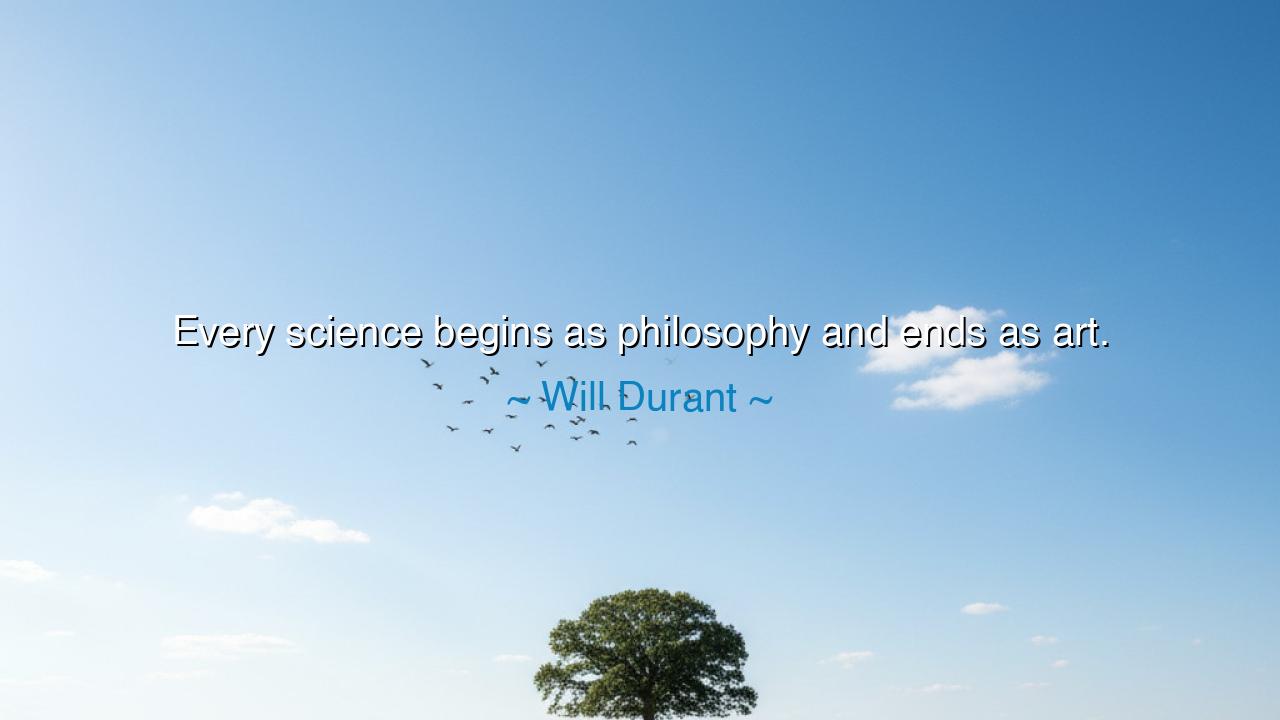
Every science begins as philosophy and ends as art.






"Every science begins as philosophy and ends as art." These words of Will Durant stir the soul, for they speak of the eternal journey that knowledge takes—an ascent from the deep, reflective pondering of the philosopher to the practiced, creative mastery of the artist. In them, Durant reveals to us a profound truth: that all human knowledge, in its purest and most honest form, begins with the mystery—an intellectual search for understanding—and ends with the expression of that knowledge in a form that transcends mere facts, becoming something beautiful, something that touches the heart. Science, in its nascent form, is a great quest, a philosophical endeavor to unlock the secrets of the universe. But in its ultimate realization, it becomes an art, a profound craft, shaped by human hands into something that enriches the world.
In the beginning, there is only the question—the burning curiosity that drives the mind. Like Aristotle, who sought to understand the very nature of existence, or Plato, who asked what is the ideal form of the world, science begins as philosophy. It is a journey that begins with contemplation, with pondering the mysteries that lie before us, asking the fundamental questions that touch upon the heart of being. Philosophy is the soil from which the great tree of science grows, each branch of knowledge reaching out to touch the stars, each rooted in the soil of thoughtful inquiry. Without philosophy, there is no science, for the seed of knowledge is first planted in the fertile ground of wonder.
Yet, as the years pass, something wondrous happens. The philosopher, with his lofty ideals and contemplative nature, passes the torch to the scientist, the one who will shape the knowledge into something tangible. But here, we encounter a paradox—just as the path from philosophy to science is born from reason and clarity, so too does science eventually make a journey towards art. It is here, in the halls of the laboratory or the libraries of the university, that we begin to see the beauty of knowledge take form. Think of Leonardo da Vinci, the great master who was not only a brilliant scientist but an artist whose study of the human body, the stars, and the natural world merged into paintings and inventions that transcended the boundaries of science and entered the realm of creative expression.
As da Vinci merged the worlds of science and art, so too did others—Isaac Newton, whose laws of motion were not simply mathematical formulas but the framework of a new worldview that would shape the art of physics for centuries. His understanding of gravity, the forces that govern the heavens, was not just a dry intellectual pursuit, but a revelation that opened the minds of generations of artists and thinkers. Art, in this sense, is not simply the painting of canvases or the shaping of clay, but the expression of knowledge in a way that speaks to the heart, that inspires, that calls us to see the world anew.
But why, you may ask, does science end as art? Why does it not remain cold and detached, a rigid pursuit of facts? Ah, it is because science is, in the end, about more than the accumulation of knowledge—it is about the transformation of that knowledge into something that moves the soul. The greatest scientists—those who have touched the deepest mysteries of existence—are also the greatest artists. They create with their discoveries, they mold the world in their image, shaping not just the material but the very spirit of humanity. The art of science lies not in its technical aspects but in its ability to change the way we see the world, to create something beautiful from the raw materials of truth.
Let us then take this lesson into our lives, dear listener. We are all, in our own way, scientists and artists. Every journey of knowledge begins with the questions that stir our souls, that drive us to seek understanding. But it does not end there. We must take that knowledge and transform it, not simply into something useful or practical, but into something that speaks to the heart of humanity. Whether in work, in relationships, or in our creations, we must learn to merge the philosophical and the artistic—to see beyond the surface and understand the deeper truths that shape the world.
As you walk your path, remember that every science begins as philosophy—the search for truth and meaning. But do not stop there. Let that knowledge become your art, your expression to the world. Seek not merely to know, but to create, to make something that reflects the beauty and depth of the truths you have uncovered. In doing so, you will not only transform the world around you but elevate your own spirit, and the spirit of those who walk with you on this journey of discovery.






AAdministratorAdministrator
Welcome, honored guests. Please leave a comment, we will respond soon